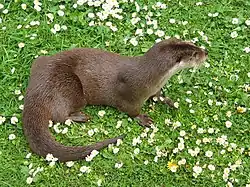ūdrs
See also: UDRS
Latvian

Ūdrs
Alternative forms
- (dialectal forms) ūdris
Etymology
From the same stem as ūdens: Proto-Indo-European *wódr̥, *wédōr (“water”), with a suffix *-ro, resulting in Proto-Indo-European *udrós (“water animal”), from which Proto-Baltic *ud-ra-s (or possibly Proto-Balto-Slavic *ū́drā́[1]). The original meaning, “aquatic animal,” is attested in Sanskrit.
- Cognates include Lithuanian ū́dra, ū́dras (compare Latvian dialectal ūdris), Old Prussian udro, Proto-Slavic *vydra (Russian, Belarusian выдра (výdra), Bulgarian видра (vídra), Czech vydra, Polish wydra, Upper Sorbian wudra), Proto-Germanic *otra < *utra (Old High German ottar, Old Norse otr, Old English otor, German Otter, Swedish utter, English otter), Sanskrit उद्र (udrá, “aquatic animal”), Ancient Greek ὕδρος (húdros), ὕδρα (húdra, “water serpent”), Latin lutra < *utrā- < *udrā- (French loutre, Romanian lutră, Italian, Portuguese lontra, Spanish lutria, nutria).[2]
Pronunciation
- IPA(key): [ûːdrs]
Noun
ūdrs m (1st declension)
Declension
Declension of ūdrs (1st declension)
References
- Kim, Ronald (forth.), “The Phonology of Balto-Slavic”, in Jared S. Klein, Brian Joseph, and Matthias Fritz, editors, Comparative Indo-European Linguistics: An International Handbook of Language Comparison and the Reconstruction of Indo-European, Berlin: de Gruyter
- Karulis, Konstantīns (1992), “ūdrs”, in Latviešu Etimoloģijas Vārdnīca (in Latvian), Rīga: AVOTS, →ISBN
This article is issued from Wiktionary. The text is licensed under Creative Commons - Attribution - Sharealike. Additional terms may apply for the media files.